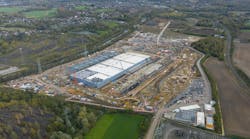Land and Expand: Aligned Data Centers, AWS, DC BLOX, Deep Edge
Land and Expand is a periodic feature at Data Center Frontier highlighting the latest data center development news, including new sites, land acquisitions and campus expansions. Here are some of the new and notable developments by hyperscalers, as well as more regional edge data center operators, about which we’ve been reading lately.
Aligned Data Centers Plans New Hyperscale Campus in Northeast Ohio
Aligned Data Centers on Sept. 25 announced its latest expansion in the North American market with a new land acquisition in Northeast Ohio. Aligned acquired the 129-acre land parcel in Perkins Township, Ohio, where it will become the site of a planned new, four-building hyperscale data center campus in a sustainable brownfield redevelopment project.
The better to support the rapid deployment of large-scale workloads for its customers in a region with abundant, reliable, low-cost power, the property Aligned acquired in Perkins Township is a former automotive equipment manufacturing facility, originally built during the Second World War. Aligned notes the acquired site sits in a geographically strategic position, in relation to developed data center hubs such as Atlanta, Chicago and Northern Virginia, in a region where numerous cloud, social media and technology companies also have deep stakes.
Ohio also offers companies a tax exemption for the sale, storage, use or other consumption of computer data center equipment, including construction materials, and electrical and cooling systems. Further, Ohio’s climate features relatively mild temperatures, making cooling requirements more manageable and less costly, and the state has a low risk of natural disasters.
Aligned said its NEO-01 data center, the first of four planned facilities for the site, will enable customers to rapidly expand on demand, supporting a variety of workloads including cloud and AI, as well as densities beyond 300 kW per rack, by deploying air-cooled, liquid-cooled or hybrid cooling solutions within the same data hall. This includes Aligned’s patented Delta³ waterless heat rejection technology and adaptive data center design, whereby customers looking to adopt liquid or hybrid cooling can quickly and efficiently expand existing footprints, without a need to build new AI-dedicated built-to-suit data centers or completely retrofit existing buildings.
“Aligned is very excited to enter the Northeast Ohio market and return a brownfield site to productive use for the local community,” said Andrew Schaap, CEO of Aligned. “As part of our sustainability mission, Aligned has not shied away from redeveloping brownfield projects that have lain dormant for many years, sometimes decades, in communities. Transforming these properties into assets for the local community is a win-win-win – removing blight, generating revenue, returning jobs to a former industrial location, and preserving greenfields for other uses. We look forward to supporting the ongoing growth of our customers and bringing new economic, environmental, and social opportunities to Perkins Township.”
AWS Submits Plans for Multiple Data Centers in Mesa
Another hyperscale data center campus will be coming to Mesa, Arizona in the Greater Phoenix data center market, where AWS (who knows something about Ohio) has now submitted plans for more than 900,000 SF of capacity across multiple data centers in Mesa, where very recently, Google and of course Facebook are also building and planning, along with numerous developers.
As reported by the Phoenix Business Journal's Brandon Brown on Sept. 27, Amazon has filed pre-submittal documents with Mesa’s planning office for two separate data centers approximately four miles apart in southeast Mesa. Both proposed projects would be built on land owned by Amazon, and would significantly increase they hyperscaler's footprint in the region's East Valley.
The report said plans for each new site are almost identical, with each data center calling for two halls at about 227,000 SF apiece. Should both projects be approved, Amazon would add approximately 908,000 SF of data center space in Mesa.
Amazon acquired both of the sites now being considered for data centers in December 2021. The report said the company paid $16.9 million for the Elliot Road property; while the Pecos property was acquired for just north of $18 million. One of the proposed data center sites involves 42.9 acres off Elliot Road, adjacent to the Apple Data Center in Mesa. The other is located on 71.3 acres at 10464 E. Pecos Road, immediately to the east of Legacy Park, a massive youth and amateur sports complex.
"It is not clear whether Amazon intends to build both of the sites out to completion or if the company will work with the city of Mesa to determine which site would be best for the data center project," added the Phoenix Business Journal's Brown, who further observed, "While it could be a lot to construct two similar data centers four miles away from each other, Amazon clusters many of its other data centers - including in Northern California, Oregon and Northern Virginia."
Brown's reporting added:
"The Pecos site was also once considered for a 701,572-square-foot logistics building that would have been a last-mile delivery hub for Amazon. That development was called 'Project Cork' and Ryan Cos. was attached to it. Public records show there has not been much movement around Project Cork since 2021 ... National design firm Kimley-Horn prepared the conceptual site plans that were submitted to Mesa for both projects. The project narrative for the Elliot data center said that Ryan Cos. was involved in developing that site."
DC BLOX Secures Land, Power for Planned Data Center In Berkeley County, S.C.
DC BLOX, a provider of data centers, dark fiber, cable landing stations and connectivity infrastructure to power digital businesses in the Southeast US, on Sept. 27 announced it has completed the purchase from Santee Cooper, South Carolina’s largest power provider, of 27.5 acres in the state's Berkeley County, with plans to construct a data center at the site.
The planned facility in the Camp Hall Commerce Park will be the third data center the company has committed to building in the state. The preliminary plan for the site includes four buildings totaling approximately 200,000 square feet of space and 45 MW of planned power, with build-to-suit options available. Berkeley County is an attractive location for data centers given the available power from Santee Cooper, its proximity to Charleston and to Google’s data center in Moncks Corner, and connectivity to the new DC BLOX Cable Landing Station (CLS) in Myrtle Beach, located at 1401 Howard Avenue.
“Camp Hall is proving to be a prime location for industrial development and investment in our County,” said Berkeley County Supervisor Johnny Cribb. “As the need for digital infrastructure becomes increasingly paramount in today’s world, we are happy to welcome DC BLOX to our area. We are confident this company’s new data center will serve as a critical asset for the information technology sector in our county, region, and beyond.”
Camp Hall is being developed by state-owned electric and water utility Santee Cooper. Unique among industrial parks because of its focus on the environment, the workforce and technology, the commerce park is designed with growth in mind, with the infrastructure, permits and entitlements for development in place.
“Camp Hall is a strategic location for DC BLOX, which will encourage and support technology-driven industries and quality jobs in the Berkeley County and greater Charleston area,” said Jimmy Staton, Santee Cooper President and CEO.
Concurrent with the new data center plan, DC BLOX will celebrate the grand opening of its new Cable Landing Station (CLS) in Myrtle Beach on Tues. Oct. 10, with an invite-only event where executives from DC BLOX, Google, and Meta, alongside South Carolina Governor Henry McMaster and Myrtle Beach Mayor Brenda Bethune, will share perspectives on the impact the CLS will have on internet connectivity in the Southeast US.
The Myrtle Beach CLS is strategically located on the South Carolina coast, benefitting the rapidly expanding hyperscale data center footprint in the Southeast. Its location provides geographic diversity for cable landings outside of the crowded mid-Atlantic and Northeast regions. The CLS will serve as a major hub for connectivity in the Southeast with space for up to five subsea cables. The CLS has so far been confirmed as the landing station for Google’s Firmina and Nuvem subsea cables and Edge Holdings’ (subsidiary of Meta) Anjana subsea cable.
DC BLOX's planed new data center in Berkeley County will also provide full connectivity throughout its new terrestrial dark fiber cable network reaching Ashburn VA, and Atlanta, GA, two major hubs for Internet traffic. In addition to new data centers, DC BLOX is also building a new high-capacity dark fiber route between its Myrtle Beach CLS and Atlanta that runs through Berkeley County, enabling an express route to the connectivity and data center hubs in Atlanta.
“DC BLOX has quickly positioned itself to serve the rapidly growing needs for digital infrastructure in the Southeast,” said Jeff Uphues, DC BLOX CEO. “Our new Camp Hall location will be an attractive data center location for hyperscalers who have an immediate need for space and power to support AI/ML and other fast-growing applications. In addition, the facility will offer access to high-capacity fiber to service their customers within the region as well as globally.”
Deep Edge expands in Charlotte, N.C. to Support Edge Interconnect and Colocation
Deep Edge this month announced the completion of the first phase of a multi-phase expansion planned in its facility in Charlotte, North Carolina.
The company notes its carrier neutral Charlotte facility is purpose-built to serve the needs of industries reliant on fast, reliable interconnection to fuel business continuity and growth. Located at 701 East Trade Street, the Deep Edge interconnect space is sited with access to multiple diverse network points, multiple fiber and IP peering points, and access to abundant power.
Deep Edge said its 701 East Trade facility was intentionally designed and built to facilitate the interconnection process. It is a Tier III data center interconnect facility with fully redundant 2N power and N+1 cooling infrastructure.
The location includes managed data center suites, secure Meet-Me-Room (MMR), access to multiple unique long-haul and regional fiber networks including AT&T, Charter Communications, Lumen, Zayo Communications and Verizon, onsite connections to redundant utility grids. It also serves as the home location for the leading North Carolina Internet Exchange Point “NC-IX.”
The evolution of Deep Edge’s capabilities in its Charlotte facility is the blueprint on which the company looks to model all its markets over time, including the existing sites in Portland, Maine; Reno, Nevada; and Columbus, Ohio. All facilities are positioned to deliver cabinet-based space, power, and cooling infrastructure, with colocation services that include direct access to the MMR, as well as the associated networks and ecosystems present at the site.
Bill Cook, chairman of Deep Edge and past CEO of Northern Virginia data center dark fiber provider Summit IG, observed, “The market needs for interconnect are evolving in Tier 2 and Tier 3 markets, and traditional data center designs are not built to accommodate the growing, specific requirements for latency and power, as well as the flexibility needed by today’s applications and the companies that leverage them to drive business forward."
Keep pace with the fast-moving world of data centers and cloud computing by connecting with Data Center Frontier on LinkedIn, following us on X/Twitter and Facebook, and signing up for our weekly newsletters using the form below.
About the Author
Matt Vincent
Matt Vincent is Editor in Chief of Data Center Frontier, where he leads editorial strategy and coverage focused on the infrastructure powering cloud computing, artificial intelligence, and the digital economy. A veteran B2B technology journalist with more than two decades of experience, Vincent specializes in the intersection of data centers, power, cooling, and emerging AI-era infrastructure. Since assuming the EIC role in 2023, he has helped guide Data Center Frontier’s coverage of the industry’s transition into the gigawatt-scale AI era, with a focus on hyperscale development, behind-the-meter power strategies, liquid cooling architectures, and the evolving energy demands of high-density compute, while working closely with the Digital Infrastructure Group at Endeavor Business Media to expand the brand’s analytical and multimedia footprint. Vincent also hosts The Data Center Frontier Show podcast, where he interviews industry leaders across hyperscale, colocation, utilities, and the data center supply chain to examine the technologies and business models reshaping digital infrastructure. Since its inception he serves as Head of Content for the Data Center Frontier Trends Summit. Before becoming Editor in Chief, he served in multiple senior editorial roles across Endeavor Business Media’s digital infrastructure portfolio, with coverage spanning data centers and hyperscale infrastructure, structured cabling and networking, telecom and datacom, IP physical security, and wireless and Pro AV markets. He began his career in 2005 within PennWell’s Advanced Technology Division and later held senior editorial positions supporting brands such as Cabling Installation & Maintenance, Lightwave Online, Broadband Technology Report, and Smart Buildings Technology. Vincent is a frequent moderator, interviewer, and keynote speaker at industry events including the HPC Forum, where he delivers forward-looking analysis on how AI and high-performance computing are reshaping digital infrastructure. He graduated with honors from Indiana University Bloomington with a B.A. in English Literature and Creative Writing and lives in southern New Hampshire with his family, remaining an active musician in his spare time.



